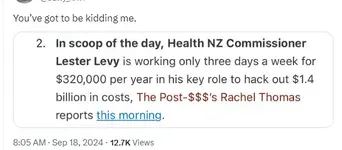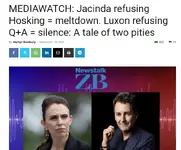Retrograde. Destructive. Setting us back on the world stage, and taking us back to the 1960s. Bought, sold and paid for by big oil and the automobile industry, the road lobby.
Of the rich, by the rich, for the rich. This is the government of the right. Corrupt.
Opinion: “Harder and faster,” says Climate Minister Simon Watts, but what does he mean?

www.nzherald.co.nz
THREE KEY FACTS
Climate Change Minister Simon Watts told a business conference last week we have to go “harder and faster” to reduce emissions.
Government policies are growing our emissions.
Conference delegates wanted the Government to take a stronger leadership role.
Simon Wilson is an award-winning senior writer covering politics, the climate crisis, transport, housing, urban design and social issues, with a focus on Auckland. He joined the Herald in 2018.
OPINION
“Let me be very clear,” Climate Change Minister Simon Watts said last Tuesday morning, using a phrase he’s picked up from who knows where. He was speaking at a big business conference looking at climate change.
Advertisement
Advertise with NZME.
“This Government wants to work with you. We need to go harder and faster in terms of emissions reduction.”
By signing up for this newsletter, you agree to NZME’s Terms of Use and Privacy Policy.
I’m not interested in Political Briefing newsletter. Please don’t show me this again.
Wait, what? It’s easy to think of Watts as one of the good guys in this Government. He says the right things, or at least tries to, and doesn’t engage in the culture war around transport.
But he knows what’s going on. They all do. Watts helped Finance Minister Nicola Willis report to Cabinet on the climate impact of the Budget, before it was announced. Spoiler alert: emissions will rise.
The attack is wide-ranging. The grants to help big emitters such as NZ Steel replace their coal boilers have been abandoned. Farm emissions will stay out of the Emissions Trading Scheme for another five years. Oil and gas exploration will resume.
Advertisement
Advertise with NZME.
Discover more
Climate changed: Why our scientists are having to redefine ...
Climate change: Eight in 10 Kiwis worried
2023 among NZ's warmest years as new climate change ...
Covid-19 adds to climate worries, says poll
Transport policy is avowedly roads-first. Rail has been downgraded, especially for freight. Council applications for public transport funding are being rejected. The feebate scheme to encourage EVs and discourage gas-guzzling utes has been cancelled. Tailpipe emissions standards have been relaxed.
Urban sprawl is welcome. There is no sign of energy-efficiency mandates for buildings or that solar generation will be scaled up in either domestic or commercial locations. The Climate Emergency Response Fund, designed to help reduce emissions, is being raided for other spending.
You might think some of these things are valuable anyway. But the fact remains, they will add to our emissions.
It’s not just that the Government is planning energy, transport, construction and other infrastructure as if we’re living in the 1960s in blissful ignorance. It is actively undoing the steps its predecessors have taken to address the climate issue.
We were on track to reduce emissions further than in our 2035 target, which is an international commitment. Now, we’re expected to overshoot it by 17 million tonnes.
That’s 35% higher than the target and equates to 153 million car trips from Auckland to Wellington.
In Watts’ defence, I imagine Cabinet meetings are not the highlight of his week.
“Hey Nicola!” calls out someone. “When are we going to kill KiwiRail?”
“Well, hang on a minute,” says Watts.
“More roads!” shouts Simeon Brown.
“Can I just -” says Watts.
“Drill baby drill!” booms Shane Jones.
“Please don’t say that,” says Watts.
“Thank you, Simon,” says the Prime Minister. “Could I just say that was a valuable contribution.”
Luxon, Watts and their officials assure us we’re still on track to reach net zero by 2050. But that’s just another way of saying we don’t need to worry now because someone else can take drastic action later.
That is not how long-term planning is supposed to work, as the Government itself is fond of telling us.
Even more seriously, 2050 is not the significant date, because on current projections the world could reach climate tipping points in the next 10 years.
“What we do in the 2030s will make or break us,” Australian climate scientist Joelle Gergis told that conference in the keynote address. “We only have one chance to get this right.”
The conference was jointly organised by the Sustainable Business Council, the Environmental Defence Society and the Climate Leaders Coalition. The combined membership of those groups includes almost all the large corporates, many small and medium-sized enterprises, industry groups, Government agencies, councils, scientists, consultants, advisory groups and lobbyists.
This is not a fringe thing. They’re at the heart of our economy.
And there was Watts last Tuesday, telling them, “The Government wants to work with you”.
Watts was in a standalone session and did not hear the other speakers. But if he’d stayed he would have learned that businesses are pleading for the Government to work with them.
One example: Air New Zealand.
The airline’s Kiri Hannifin talked about her “grief” when the company abandoned its 2030 emissions reduction targets, a decision prompted by the knowledge it could not secure fuel-efficient planes and enough sustainable aviation fuel (Saf) in time.
Kiri Hannifin, Air NZ chief sustainability and corporate affairs officer. Photo / Dean Purcell
Kiri Hannifin, Air NZ chief sustainability and corporate affairs officer. Photo / Dean Purcell
But, she warned, by 2030 “nearly every port we fly into” will have a legal requirement that planes flying out are using Saf. “We need that in New Zealand, too.”
As Andrew Petersen from the Business Council for Sustainable Development Australia explained, Government has a critical role in forcing the pace of change.
“The market on its own won’t save us,” he said. “Policy and regulation are vital. They create speed and scale, and they eliminate free riders and others trying to game the system.”
Watts said, “We are taking a market approach to achieving our emissions reduction. But if we need regulations to support that then we will do that”.
And yet almost no emissions-reducing regulations have been sighted to date.
He talked about the proposed fast-track approvals law. “We have a massive pipeline of renewable energy projects,” he said, “but we are not building it. The role of Government is to get these projects built”.
Yet right now, some electricity gentailers are sitting on plans for wind farms for which they already have consents. Where are the regulations and the sector reform needed to get those farms built?
“New Zealand could be a poster child for wind,” keynote speaker Gergis said.
Yet despite our enormous natural advantages, Bloomberg has ranked New Zealand 66th in the world for investment in renewables.
To improve that, we don’t need new fast-track legislation, we need the Government to abandon its fossil-fuel ambitions and focus relentlessly on wind and solar.
“Why is the Government restarting oil and gas exploration?” asked the conference MC, Kathryn Ryan from RNZ.
Watts said gas was needed as “a transition fuel” and another dry winter was expected next year.
But exploration is speculative, investors are wary and even if new fields are discovered they’re unlikely to come on stream inside the next 10 years. It’s a red herring.
Rod Carr, who will retire as chairman of the Climate Change Commission in December, said, “Why we would think we want more fossil fuels in our economy is nuts. We should be doubling down on the renewables opportunity to replace the huge amounts of imported fossil fuels. And we should have leaders who can explain that”.
Rod Carr, chairman of the Climate Change Commission. Photo / Michael Craig
Rod Carr, chairman of the Climate Change Commission. Photo / Michael Craig
Watts, though, wasn’t thinking that way. “We need to know what is practical,” he said.
This is the Government’s standard line: Climate action is important but it cannot undermine economic progress.
Petersen, among others, put the other point of view. “The brutal reality,” he said, “is that we are no longer living in an economy that can pursue growth without limits”.
Besides, “knowing what is practical” doesn’t really underpin the Government’s climate policy.
Existing technologies such as smart meters, better insulation, EVs and e-bikes are practical, but they’re regularly ignored or undermined.
Is the Government waiting for some magic-bullet new technology? Watts is keen on climate capture, for example, which involves storing carbon in abandoned reservoirs and elsewhere.
Gergis warned that carbon capture has so far had no more than a 0.1% benefit, and “the larger potential possibly is still only 1%”.
Why wait for unproven technologies? she asked. “It is already possible to reduce emissions by 50-80% by 2030 using existing technologies. All we lack is the political will.”
That lack of will shows up in more than the specific policies. Policymaking itself is not framed by a whole-of-government approach to the climate crisis.
Witness the Cabinet decision to ignore the Budget’s impact on emissions. Witness also the recent appeals for a cross-party accord on infrastructure. From the Prime Minister down, the ministers involved have barely mentioned climate change.
It’s simply not credible to propose long-term planning while ignoring the changing climate. Even Infrastructure Minister Chris Bishop has admitted it’s “an existential threat to the planet”, although he had to be pushed to do it.At the conference, Ryan asked Watts, “How on board is your transport minister, Simeon Brown?”
“He’s 100% on board,” Watts said.
But transport emissions will rise on Brown’s watch and he even had emissions-reduction targets removed from his new National Land Transport Programme (NTLP).
“Simeon is rolling out a whole lot more EV chargers,” added Watts. “We know in two to three years most new car purchases will be EVs or plug-ins anyway.”
Whoa. Last year EV sales did indeed climb to reach half of all new-car sales. We had one of the fastest uptakes in the world.
But then Brown removed the subsidy and sales collapsed. Kirsten Corsen of Drive Electric told the conference they now sit at just 9%.
Watts and his colleagues presumably know that Governments of the future will have to abandon fossil fuels. This creates uncertainty for infrastructure investors, who will charge higher prices for their money and demand punitive get-out clauses to prevent Governments coming to their senses.
To disguise this, ministers stoke a culture war. They rail against cycleways when the issue is how to get fossil fuels out of the economy.
Has there ever been a politician as obsessed with cycleways as Simeon Brown? Illustration / Rod Emmerson
Has there ever been a politician as obsessed with cycleways as Simeon Brown? Illustration / Rod Emmerson
There was a big theme at that conference, which I’ll report more about soon. As KPMG partner Alec Tang said, “80% of New Zealand trade by value goes to countries that have or soon will have mandatory emissions-reporting standards”.
That’s countries everywhere, looking for ways to reduce emissions together. The world is watching and we’re not keeping up.
You bet business wants to work with Government. What I heard at that conference is that they want it to stop pretending the economy is separate from the environment, because it puts our markets at risk.
You’d think those big business brains in the Cabinet would understand that.

 www.nzherald.co.nz
www.nzherald.co.nz





